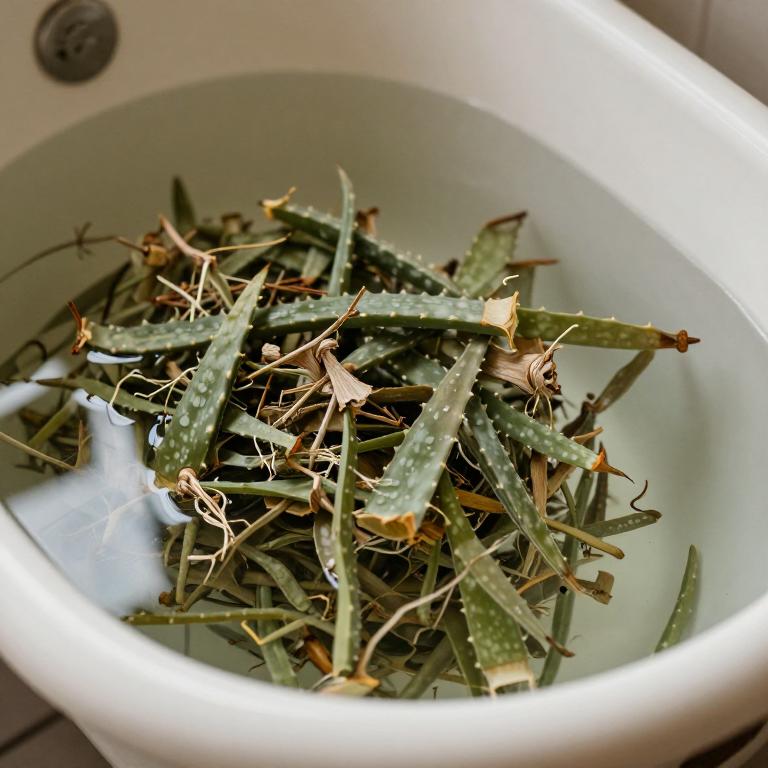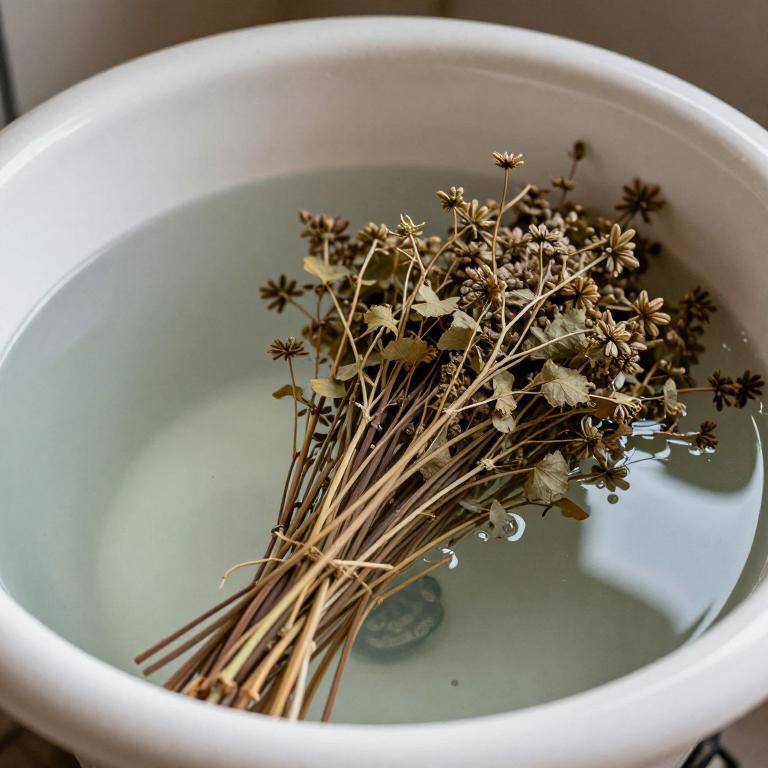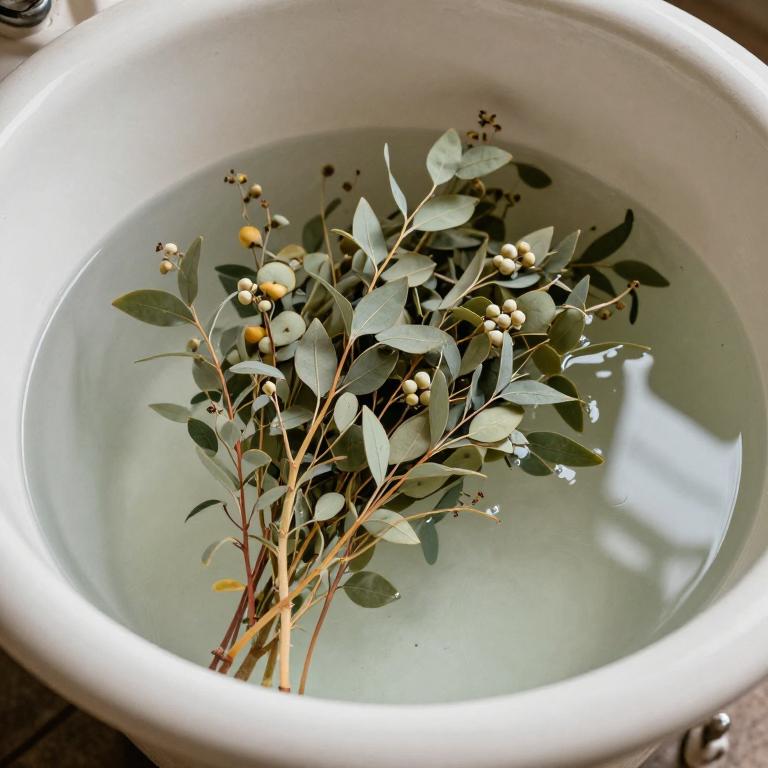10 Best Herbal Baths For Ingrown Hair

Herbal baths can be an effective natural remedy for soothing and preventing ingrown hairs, as certain herbs possess anti-inflammatory and antimicrobial properties that help reduce irritation and infection.
Herbs like chamomile, calendula, and lavender are commonly used in bath infusions due to their ability to calm the skin and promote healing. To prepare an herbal bath, simply steep a handful of dried herbs in hot water and add the infused liquid to a warm bath, allowing the skin to soak for 15 to 20 minutes. This gentle treatment can help exfoliate dead skin cells and unclog pores, reducing the likelihood of ingrown hairs.
Regular use of herbal baths can also enhance overall skin health and provide a relaxing, therapeutic experience.
Table of Contents
- 1. St. john's wort (Hypericum perforatum)
- 2. Stinging nettle (Urtica dioica)
- 3. Field horsetail (Equisetum arvense)
- 4. German chamomile (Chamomilla recutita)
- 5. Aloe vera (Aloe barbadensis)
- 6. Rosemary (Rosmarinus officinalis)
- 7. English lavender (Lavandula angustifolia)
- 8. Dog rose (Rosa canina)
- 9. Parsley (Petroselinum crispum)
- 10. Melaleuca (Melaleuca alternifolia)
1. St. john's wort (Hypericum perforatum)

Hypericum perforatum, commonly known as St. John's Wort, has been traditionally used for its anti-inflammatory and antiseptic properties, making it a potential remedy for ingrown hair when incorporated into herbal baths.
To prepare a St. John's Wort bath, steep a handful of dried herb in hot water for 15-20 minutes, then add the liquid to a warm bath, ensuring the water temperature is comfortable and not too hot. Soaking in the bath for 15-20 minutes allows the skin to absorb the beneficial compounds, which may help reduce redness, irritation, and infection associated with ingrown hairs. This natural remedy is particularly beneficial for those with sensitive skin or those seeking alternative treatments to conventional methods.
However, it is important to consult a healthcare provider before use, especially if taking medications, as St. John's Wort can interact with certain drugs.
2. Stinging nettle (Urtica dioica)

Urtica dioica, commonly known as stinging nettle, has been traditionally used in herbal baths for its anti-inflammatory and astringent properties, which may help in managing ingrown hairs.
When prepared as a bath, the leaves of urtica dioica can be steeped in warm water to create a soothing solution that helps reduce redness and irritation associated with ingrown hairs. The high concentration of silica and antioxidants in stinging nettle may support skin healing and prevent further inflammation. However, it is important to ensure the bath is not too hot to avoid aggravating the skin condition.
While some individuals may find relief from using urtica dioica baths, it is advisable to consult a healthcare professional before incorporating it into a skincare routine, especially for those with sensitive or compromised skin.
3. Field horsetail (Equisetum arvense)

Equisetum arvense, commonly known as field horsetail, is a herb traditionally used for its high silica content and potential skin-healing properties.
Herbal baths infused with equisetum arvense may help reduce inflammation and soothe irritated skin, making them a potential remedy for ingrown hairs. The astringent properties of horsetail can help tighten pores and prevent further clogging, which is often a root cause of ingrown hairs. To use it, you can steep dried horsetail in hot water and add it to a warm bath, allowing the skin to absorb its beneficial compounds.
However, it is important to consult with a healthcare provider before using it, especially if you have sensitive skin or existing skin conditions.
4. German chamomile (Chamomilla recutita)

Chamomilla recutita, commonly known as chamomile, is a popular herbal remedy often used in baths for its soothing and anti-inflammatory properties.
When used in a chamomile herbal bath, it can help reduce redness and irritation associated with ingrown hairs, which are a common issue, especially after shaving or waxing. The essential oils and flavonoids in chamomile have mild antiseptic and calming effects that may promote healing and prevent infection in affected areas. To prepare a chamomile bath, steep a handful of dried chamomile flowers in hot water for about 10 minutes, then add the liquid to a warm bath and soak for 15 to 20 minutes.
Regular use of such baths can support skin health and provide relief from the discomfort of ingrown hairs.
5. Aloe vera (Aloe barbadensis)

Aloe barbadensis, commonly known as aloe vera, is often used in herbal baths to help alleviate the discomfort of ingrown hair by soothing inflammation and promoting skin healing.
The gel extracted from the aloe plant contains anti-inflammatory and antimicrobial properties that can reduce redness and prevent infection in affected areas. When used in a warm bath, aloe vera can help soften the skin and exfoliate dead skin cells, making it easier for ingrown hairs to emerge naturally. Its hydrating effects also help maintain skin elasticity, reducing the likelihood of future ingrown hairs.
Incorporating aloe barbadensis into a regular skincare routine can be a natural and effective way to manage and prevent ingrown hair issues.
6. Rosemary (Rosmarinus officinalis)

Rosmarinus officinalis, commonly known as rosemary, is a versatile herb that can be used in herbal baths to help address issues related to ingrown hairs.
The essential oils found in rosemary, particularly camphor and pinene, possess anti-inflammatory and antimicrobial properties that can reduce redness, irritation, and infection associated with ingrown hairs. When infused into bath water, rosemary promotes circulation and gently exfoliates the skin, helping to prevent hair from growing back into the skin. To use rosemary in a bath, simply steep a handful of fresh or dried rosemary leaves in hot water for 10–15 minutes before adding it to a warm bath.
Regular use of rosemary herbal baths can support skin health and provide a soothing, natural remedy for managing ingrown hair concerns.
7. English lavender (Lavandula angustifolia)

Lavandula angustifolia, commonly known as English lavender, is often used in herbal baths to help manage ingrown hair due to its soothing and anti-inflammatory properties.
The essential oils in lavender can help reduce redness and irritation associated with ingrown hairs, promoting a calming effect on the skin. Adding a few drops of lavender oil to warm bath water can enhance circulation and ease the discomfort of ingrown hairs. Its antimicrobial qualities may also help prevent infections in affected areas.
Overall, lavender baths offer a natural and gentle approach to supporting skin health and reducing the discomfort of ingrown hairs.
8. Dog rose (Rosa canina)

Rosa canina, also known as rosehip, is a natural herbal remedy that has been traditionally used for its anti-inflammatory and skin-repairing properties.
When incorporated into herbal baths, rosa canina can help soothe irritated skin and reduce redness associated with ingrown hairs. The essential oils and nutrients in rosehip seeds promote skin regeneration and improve the texture of the skin, making it beneficial for those with sensitive or acne-prone skin. To use rosa canina in a bath, simply add a handful of dried rosehip berries or a few drops of rosehip oil to warm water and soak for 15 to 20 minutes.
Regular use of rosa canina herbal baths can support healthy skin maintenance and potentially reduce the occurrence of ingrown hairs.
9. Parsley (Petroselinum crispum)

Petroselinum crispum, commonly known as parsley, has been traditionally used in herbal baths for its soothing and anti-inflammatory properties.
When infused into bath water, parsley can help soften the skin and reduce irritation associated with ingrown hairs. The essential oils in parsley, such as apiol and limonene, may help to gently exfoliate the skin and promote the natural shedding of dead skin cells. Using a parsley bath can also help to reduce redness and swelling around affected areas, offering a natural remedy for those dealing with ingrown hairs.
For best results, it is recommended to steep fresh parsley in warm water for several hours before use, allowing the beneficial compounds to infuse into the bath.
10. Melaleuca (Melaleuca alternifolia)

Melaleuca alternifolia, commonly known as tea tree oil, is a popular natural remedy used in herbal baths to address ingrown hair issues.
Its antiseptic and anti-inflammatory properties help reduce bacterial infection and inflammation associated with ingrown hairs. When diluted properly in warm water, tea tree oil can soothe the skin and prevent further irritation. Regular use of a tea tree oil bath may help prevent future ingrown hairs by keeping the skin clean and balanced.
However, it is important to ensure proper dilution to avoid skin irritation, as undiluted tea tree oil can be harsh on sensitive skin.